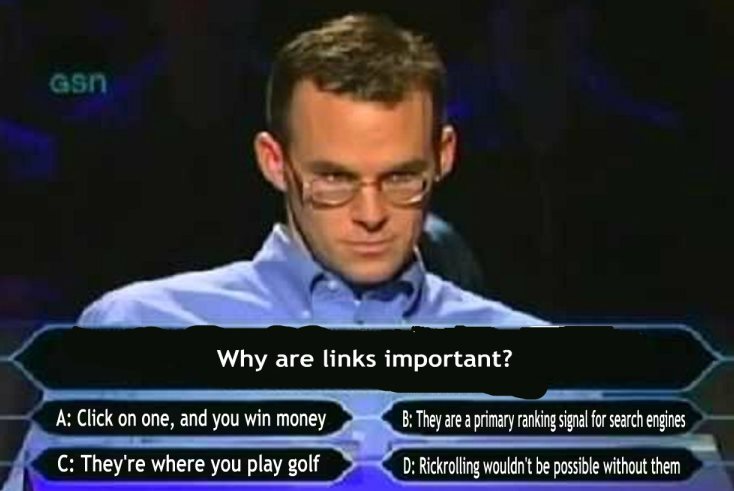Why are links important?
If you answered B, congratulations! Time for your train station Bollywood dance sequence!
Reminder: Slumdog Millionaire won Best Picture at the Oscars the same year The Dark Knight and WALL•E were eligible.
Links are still one of the most important ranking signals for Google. They always have been. The more relevant and authoritative backlinks you have that point to your site, the more likely you are to rank.
How many people know this outside of our industry, though? Confession: I didn’t learn this in college. In fact, a large majority of my friends outside of the SEO industry weren’t aware of this until I told them either. When you don’t obsess over search engines for a profession, it’s very easy to not consider how Google works.
To the uninformed, a link is nothing more than a digitized method of transportation across the Internet. I’m not going to deny that navigation is an important function of the link. It is.
But a link has so much more purpose beyond being just another component of a complicated search algorithm. Links also affect:
• Exposure
• Navigation
• Promotion
• Authority
• Relationships
Exposure
Name association is one of the most important parts of marketing, even if the association is negative. The old adage of, “There’s no such thing as bad publicity,” may not be wholly true, but I’d say it often is.
The more users see your brand name, the better. This is especially true if they see your brand name tied in with an authority/influencer (more on this in a bit).
In 1968, Robert B. Zajonc of Michigan University conducted a study in which he showed participants a random series of nonsense symbols meant to resemble Chinese characters. The participants were asked to guess the meaning of the symbol. Zajonc would display the same symbols up to 25 times, and the more and more participants saw the same symbol, the more likely they were to give a positive definition.
Zajonc conducted other similar studies, all of which reached the same conclusion: people tend to like what’s familiar.
The Internet is the most familiar communication platform in the world. More and more people are ditching traditional television, especially millennials. It’s an online globe now.
Because people are spending more of their time online now, it’s essential for businesses to have a web presence. How can you cultivate such visibility? Through links.
Activity on the Internet is overwhelming by practically every standard. It’s not at all enough to build your website and expect people will find you because your website is awesome. It’s imperative to get your name out there.
Links on other sites are your billboard. [Tweet This] They’re your brand name or your target keywords in bright blue text.
Navigation
Of course, at its most basic, a link is a device that allows a user to be transported from one web document to another. Not every link passes link equity, but every link will deliver you to another page, even if that page is no longer active.
For all of our talk about how links can lead to a fountain of search traffic, a link on a high-authority page can be the catalyst for a steady flow of qualified referral traffic by itself.
When you build a link on a high-authority domain, the users who regularly visit that domain have instantaneously made a positive association with your site. Think of it this way: when someone you respect in your book club recommends a book you haven’t read, you’re going to be inclined to read that book now.
In that same manner, users are going to trust that their favorite sites are going to only link to other worthwhile sites. Ipso facto, they are more likely to click on your link.
I will say, however, that referral traffic is not what a link builder should be chasing. If you’re building the right kind of links, the kind of links that build search visibility, referral traffic will be a secondary benefit. Keep the horse in front of your cart.
Promotion
The definition of link building has evolved within the last couple of years, especially in the wake of the Penguin algorithm.
In the years before Penguin, link building was commonly a process of submitting links to sites with no real audience as a way of manipulating the search algorithm. Now that Penguin has made significant strides in fighting webspam, link building has become something completely different. Link building, more than ever before, is just another form of promotion.
Seriously.
When you’re reaching out to a site in order to request a link, it’s not extraordinarily different from a sales pitch. You’re expressing the unique value of your brand to a target audience.
The webmaster you’re communicating with doesn’t know why your link would be beneficial to her/his audience. Otherwise, the link would already be here.
Thereby, through the process of finding sites and reaching out to webmasters, you are essentially promoting your brand name to an audience that may only be vaguely familiar with you or may not know you at all.
Authority
In most industries, establishing authority is crucial. No one wants to buy, say, life insurance from a brand that’s seemingly clueless. You want to be in good hands.
So how can a brand reinforce its image as an authority? There are several ways, but my personal favorite is through link building.
This ties into the exposure section from above. When people see your brand endorsed by other respected sites in your niche, their authority rubs off on you. It’s a lot like a political campaign: When you’re running for a Senate seat, you would be really, REALLY excited if the (popular) President came to your home state and gave a speech for you.
Google rewards authoritative links. It’s in their best interest to rank sites that accumulate backlinks from authoritative and credible sources. The more you seek authority links, the more likely Google is consider you an authority. That’s nothing but a good thing.
As you accumulate these links, you’re more likely to rank for search phrases relevant to your site. This ties back to exposure again. As users see your brand continually pop-up in the results for key phrases, they will associate your website as an authority in your industry.
This is great exposure both online AND offline. Just because someone doesn’t make an immediate online purchase doesn’t mean they won’t be a customer in the future. Your brand is in their mind, and it’s in their mind as an authority.
I liken it to the yearly Budweiser ads for the Super Bowl. Considering the amount of commercials they produce and the exorbitant fees, they can’t actually expect to make all of their money back within a, say, three-hour window of the game. But the name of their brand is fresh in our society’s head for the near future, especially since people will recap their favorite commercials the next day. It’s an investment in exposure.
Let’s forget search again here for a second though. Not all links are created equal. Nofollow links provide little–if any–link equity. Yet I would argue, and so would many others, that it’s a good thing to have some nofollow links that point back to your site.
For example, Wikipedia nofollows all of their outbound links. Yet I assure you everyone that has a link on Wikipedia isn’t complaining. It’s the sixth most powerful site according to Alexa (seventh globally).
Users look at a link on a site on Wikipedia, and they instinctively assume that the link must be credible. It may not pass link equity, but it passes some of its own brand authority.
Relationship Building
It’s been said by many an SEO before me: link building is relationship building, and vice-versa. [Tweet This]
At least it should be.
When you’re outreaching to build links, it’s easy to forget that the recipient of your email is a human being. We may never interact with this person face-to-face, but he/she is a person with passions and ambitions for her/his site.
It’s important to remember that when you request a link from a webmaster, there are potential opportunities beyond the link. When a webmaster links to you, it’s a signal that that webmaster may be open to other kinds of partnerships in the future. The partnership may come in the form of a regular blog contribution, a sponsored webinar, or even some offline opportunities.
The point is that link building and relationship building can and should be done simultaneously. Neither are mutually exclusive.
Link building practically forces you to engage with the influencers of your niche and your audience. It’s a convenient way to forge partnerships with those who will further your interests in any number of capacities in the future.
More Than Just A Freeway Exit . . .
People outside of the SEO industry don’t ruminate over the purpose of a link on a page. We’re in a peculiar field to be sure.
Whereas we place a great emphasis on the organic search value of links, the regular user understands a link as a freeway exit on the the digital infrastructure we call the web.
Those interpretations are not incorrect, yet they are incomplete in their understanding. Links are the currency of the most powerful communication tool ever created. They are signals of trust and authority to both users and search engines.
Ultimately, links are one of the pillars of foundation of the world wide web.
 Jesse Stoler is a Content Specialist at Page One Power, a link building firm based out of Boise, Idaho. He is also a staff writer for Linkarati. His hobbies include stand-up comedy and pretending he has fans. Find him on Twitter and Google+
Jesse Stoler is a Content Specialist at Page One Power, a link building firm based out of Boise, Idaho. He is also a staff writer for Linkarati. His hobbies include stand-up comedy and pretending he has fans. Find him on Twitter and Google+


